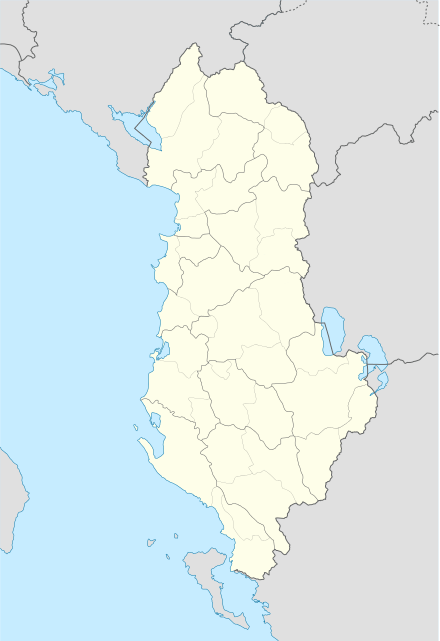Progër
| Progër | |
|---|---|
| Administrative Unit | |
 Progër | |
| Coordinates: 40°42′N 20°56′E / 40.700°N 20.933°ECoordinates: 40°42′N 20°56′E / 40.700°N 20.933°E | |
| Country |
|
| County | Korçë |
| Municipality(s) | Devoll |
| Time zone | UTC+1 (CET) |
| • Summer (DST) | UTC+2 (CEST) |
Progër is a village and a former municipality in the Korçë County, southeastern Albania. At the 2015 local government reform it became a subdivision of the municipality Devoll.[1] The population at the 2011 census was 3,988.[2] The municipal unit consists of the villages Progër, Mançurisht, Cangonj, Pilur, Vranisht, Bickë, Rakickë and Shyec.[3]
Demographics
In 1900, the village of Rakickë was a mixed village whose population consisted of 360 Albanians and 300 Orthodox Macedonians, though by the 1970s had become a wholly Albanian inhabited village.[4]
During the late 2000s linguists Klaus Steinke and Xhelal Ylli seeking to corroborate villages cited in past literature as being Slavic speaking carried out fieldwork in some villages of the area.[5] Rakickë and Shyec was noted as not having a Slavic speaking population with villagers speaking Albanian and older generations stating have used only that language.[5] Villagers from nearby Pustec municipality that speak south Slavic languages being well informed about the situation of their minority and neighbouring villages stated that they were not aware of anyone having spoken their language in Rakickë and Shyec.[5]
Notable people
References
- ↑ Law nr. 115/2014 Archived 2015-09-24 at the Wayback Machine.
- ↑ 2011 census results Archived 2015-09-24 at the Wayback Machine.
- ↑ Greece – Albania Neighbourhood Programme Archived 2012-03-27 at the Wayback Machine.
- ↑ Włodzimierz, Pianka (1970). Toponomastikata na Ohridsko-Prespanskiot bazen. Institut za makedonski jazik "Krste Misirkov". p. 139. "Ракитско е сега албанско село, но во год. 1900 имало 300 жит. М. и 360 А."
- 1 2 3 Steinke, Klaus; Ylli, Xhelal (2007). Die slavischen Minderheiten in Albanien (SMA): Prespa - Vërnik - Boboshtica. Munich: Verlag Otto Sagner. pp. 19–20. ISBN 9783866880351. "Die Suche nach weiteren Ortschaften mit slavischsprachiger Bevölkerung verlief ergebnislos. Vor allem die für den Raum Korça, Bilisht, Pogradec und Librazhd in der Literatur häufiger genannten Dörfer wie Miras (Božigrad), Bulgarec, Tren, Buzëliqen (Zagradec), Buçimas (Starova), Proptisht und Rajca haben, wie die Überprüfung vor Ort zeigte, keine slavischprachige Bevölkerung mehr.... Überall spricht man aber ausschließlich Albanisch, und bereits die ältere Generation hat angeblich nur diese Sprache benutzt.... Auch die Informanten in den von uns besuchten slavischen Dörfern, die im aligemeinen sehr gut über die Situation ihrer Minderheit und über die Nachbarorte informiert sind, konnten keine weiteren außer den hinlänglich bekannten Orten nennen. Insbesondere bestätigten auch sie, daß es z.B. in den Nachbardörfern Tren, Buzëliqen, Shuec, Bitincka, Trestenik, Rakicka usw. niemanden mehr gibt, der ihre Sprache spricht.... Bekräftigt werden diese Zweifel teilweise von den Bewohnern der Dörfer Cerje und Vërnik, aus denen ebenfalls hervorgeht, daß ,,ihre Sprache” z.B. in den Nachbardörfern Rakicka, Tren usw. nicht gesprochen wird."

